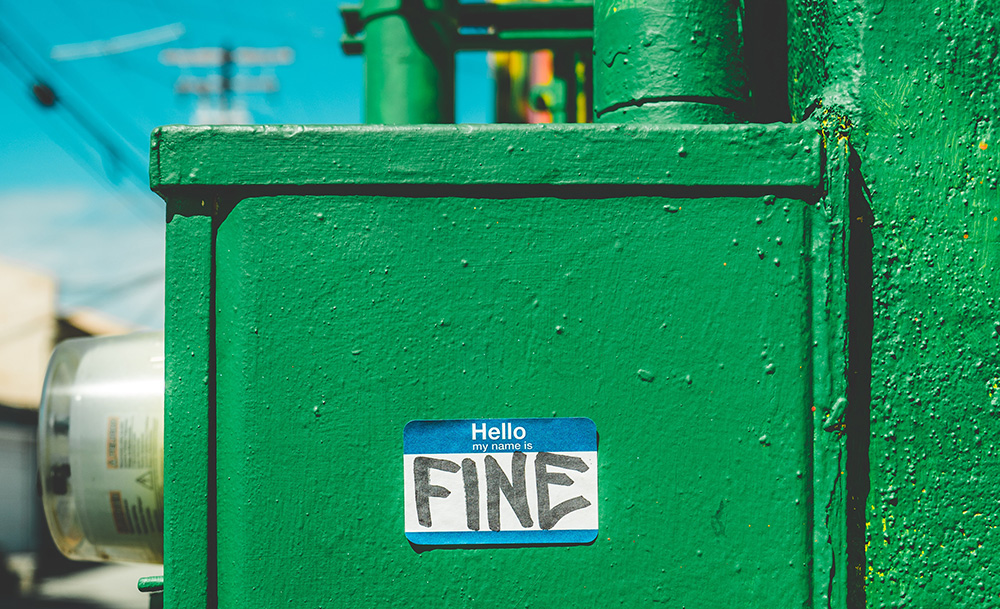How do you choose a name for your business?
Some people get an instant, instinctive feeling of what’s spot-on for them, others already have a cherished name they’ve been saving for the right time, but for most of us it isn’t a straightforward process.
And, because naming is one of the elements we need to have in place early on (ready for branding, building a website, networking, and advertising), it can become a major roadblock to getting our new business off the ground.
I’ve named a business for myself four times now, so here are a few snippets of experience that may save you some time, give you a new perspective, or at least reassure you as you navigate this process.
1. Don’t spend ages on finding the perfect name
It’s easy to get paralysed by perfection, and put everything else on hold until you find something you absolutely adore. Or to overthink it so much that words become a meaningless jumble and you forget how to construct basic sentences. Just start: start now.
The name matters… but probably not as much as you think it does. Yes, it is preferable to get it sorted from the beginning, but it absolutely can be changed later if necessary. I’ve seen a number of creatives and entrepreneurs manage this pretty smoothly, bringing their audience along with them, gracefully shifting into new branding.
2. Gather loads of material to work from.
Write out as many words or phrases as you can think of that link to your industry or sphere, your interests and unique and precious things, and your business values. Start pairing them up in twos or threes and see if anything sticks.
I also love secret codes, and anagrams can be helpful here – Ace and Wren was sparked from one. There are plenty of free generators on the web, so feed in some of your word combinations and see what it churns out. You may not end up using the whole anagram, but it can give you a new angle if you’re bogged down in the same old phrases.

3. Before you go too far and fall in love, check if the web domains are available.
You land on the perfect business name. It feels exciting and individual and comfortable… and then you discover that quite a few other people have got there first. It doesn’t necessarily mean you can’t use the name, especially if you’re in a different type of business, but it is so frustrating to have to do virtual contortionism just to get your own website and social media handles.
(My first choice for Ace and Wren was ‘Yellow Raven’, but there are a LOT of Yellow Ravens out there, my friend. I’d have ended up as YellowRaven345 or something random.) Ideally, people will be able to google your business name and find you super easily (tip-top SEO will help with this, but it’ll be easier if you don’t have to compete with similar names). So get this step in early – the longer you spend getting attached to a name, the more of a wrench it is to let it go later.
4. Get a fresh perspective from another human.
If you can bounce ideas off someone who isn’t in your niche, brilliant! Even if they don’t come up with anything to add, they can usually alert you to anything glaring you may have missed.
One of my big words for my illustration business was ‘hope’, and I tried SO MANY combinations. One of the early considerations was ‘Hold & Hope’…until my friend said that made her think of desperately trying to find a toilet when you’re out and about. Yep, not the vibe I wanted for my beautiful stationery. (I eventually abandoned all hope and called it Rock Paper Swan.)
There will always be an angle you just can’t see, or a connotation you haven’t thought of. Good friends don’t let friends give their business an icky name.
5. Make sure it’s pronounceable and spellable.
An exception first of all: if you want to use your own name, go ahead, even if it’s a little unusual. Your own identity is important; people will learn. What I’m talking about here is special nicknames, in-jokes, an obscure word that you’re fond of… have a careful think about how you’ll communicate these.
Our brains prefer familiar things which are easy to grasp. If customers have to think harder to process or retain your business name, even briefly, you’re potentially setting yourself a bigger challenge to guide them through getting to know you, buying from you, and remembering you.

6. Finally, while we’re talking about cognitive tendencies, let’s circle back to where we started – you don’t have to find a perfect name. The familiarity effect is your friend here: in short, once we’ve chosen something, we tend to like it more simply because we’ve chosen it. (I know that doesn’t sound very rational, but then humans generally aren’t.)
I named Rock Paper Swan out of sheer exhaustion in the end – I didn’t have anything else left on the table, the domains were available, it has a familiar ring to it, and I didn’t hate it. That was the grand decision-making process. At first, I semi-apologised whenever I introduced it, saying “I know it’s a bit weird/random…” but four years later, I’m pretty fond of it. It is what it is. Thanks, familiarity effect.
The upside for you is: if you have to compromise a little on naming, or you’re not feeling totally fired up about it, it’ll probably be fine. The simple act of choosing it, and getting on with your branding, marketing strategies, and business admin, will help you like it more. And if a year down the line, the most wonderful name comes out of nowhere in the middle of the night?
You can change then. But start now.
